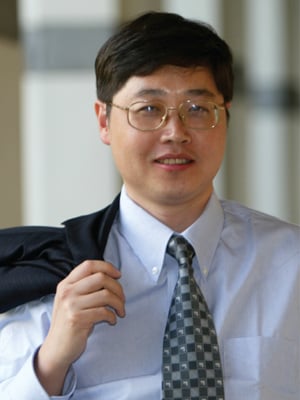
Post-crisis Exit Strategy Easier for China
CEIBS Economics Professor Xu Bin Offers His Outlook for the Chinese Economy in 2010, and Beyond
To help CEIBS Alumni assess their business strategy for this year, the school’s alumni magazine TheLINK interviews a top economist.
TheLINK: What do you expect for China’s economic development in the short term?
Prof Xu Bin: It is not surprising that China’s GDP growth-rate reached 8.7% for 2009. We all know China’s fiscal stimulus package was very large. But the government cannot continue on that scale indefinitely; the stimulus package is going to run out of steam.
During the first half of this year, China is still going to feel the momentum of the fiscal stimulus package. Also, we are going to see beautiful numbers on China’s exports in early 2010, mainly due to the very low base level of 2009. It is dangerous if you see false signs of recovery and suddenly feel that the economy is strong. In fact, in the second half of 2010, the government policy may not continue in such a strong way and China’s export numbers may not look as good.
In the second half of 2010, most major economies – especially the US – are likely to start their exit strategy by raising interest rates. The initial effect will be negative on all fronts because the move will withdraw excess liquidity. Chinese policymakers know this very well, but they will have an easier time implementing their exit than Western countries.
As a result of the exit process, China is not going to see a very robust year this year. Overall, I expect the growth-rate to be only slightly better than 2009, at 9% and not over 10%.
Still, I am quite positive about China’s outlook for the next 5 to 10 years. If we see 12% growth, it is overheated, but if we see rates of 8-10%, this is healthy and sustainable. China’s growth is driven by urbanization, so this will drive the economy not for 5 years but for 10 years. If we compare China with Japan, we should compare Japan in the 1960s not Japan in 1980s. In the 1960s, Japan began 20 years of positive growth. That is the stage where China is now.
TheLINK: Besides domestic consumption, what other factors will drive China’s economic development?
Prof Xu Bin: The government emphasizes the urbanization of China as the engine of economic growth. We know China is no longer able to rely on the external market for growth, as it did from 2001 to 2008. We are now entering a ‘new normal’ period. The U.S. will not return to its former consumption pattern, China will no longer export so much.
Concerning internal consumption, there is too much focus on promoting consumption in the advanced regions of China. Consumers in the under-developed regions are relatively poor but this is where the potential is. If China spends more money developing infrastructure in these regions, and if we continue land-use reform there, we would see purchasing power increase tremendously.
The financial crisis has created an interesting side effect. After the crisis, many people from undeveloped regions returned to their home-towns and some started businesses. Now the recovery has started but some workers are staying in their hometowns and running businesses. This is a fantastic development. If China could incentivize those young people in the undeveloped regions, all China would benefit.
[Reprinted with permission from The China Europe International Business School.]





